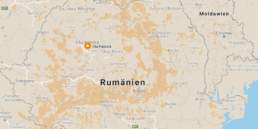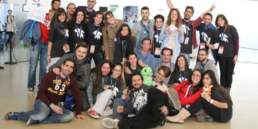Former AEGEE-Academy speaker Peter Daemen experiences a completely new world currently: a couple of weeks ago the 29-year old business analyst started a new job in Beijing. “Work itself is one long string of inter-cultural experiences, and it is awesome”, he says. The Golden Times asked the former Vice-President of AEGEE-Enschede and project team member of the “Youth & Globalisation” project about his new life and his impressions. Peter: “AEGEE has brought me quite some cultural sensitivity. This helps me out here, though it was just a start!”
Golden Times: Peter, since when do you live in Beijing?
Peter Daemen: I am working for a Beijing based joint venture since November/December last year and moved to Beijing two weeks ago!
Golden Times: Cool. What are you doing there precisely?
Peter Daemen: I have been sent by Shell to work in the start-up team for a joint venture company between Shell and Great Wall Drilling Company, a division of China National Petroleum Corporation. I work in procurement and am helping out developing and implementing the international procurement activities of the joint venture. It’s exciting, to be under the umbrella of two of the biggest companies on the planet, but still having great entrepreneurial liberty, as the joint venture is in start-up phase. We basically do what it takes to get things done! By the way, I must be in the most unpopular part of the business for many folks in AEGEE: I buy fracturing equipment for use in shale gas activities in the US and China.
Golden Times: Why did you decide to go to China?
Peter: I have been on the negotiating team of a few large fabrication and construction contracts that were being developed in China. I remember flying in seeing a bridge crossing a five kilometer wide bay from the plane. In the middle of the bay, the bridge split up in two and there was a sort of high-way junction in the middle of the water, suspended on pillars. Then after landing, during a one-hour taxi travel to the contractor site, I saw more active construction sites building skyscrapers than I have ever seen in my life. Then later visits to Shanghai left a “New-York-On-Steroids” kind of impression on me, so it was a done deal: “I must live in China, this is where it happens!” So from there I worked my way through my network inside the company and stumbled across this joint venture project. Having had a great year last year in the company and receiving several recognitions for it, I found my way into the joint venture start-up team, so I went!

Golden Times: Excellent! How did you prepare for this adventure?
Peter: Organising the transfer was done by an agent and by Shell so that went on behind the scenes, smoothly without my involvement. In the meanwhile I was working in China already by means of business trips. At the same time I wanted to spend time with my girlfriend, manage my social life, so yeah… I was everywhere and nowhere, except at home to pack and prepare. When all paperwork and confirmations were done I packed my stuff in under half a day and flew off the next day.
Golden Times: Was it hard to arrange bureaucratic procedures such as work permits?
Peter: Well, if you have time to respect the system, everything is easy, so we didn’t push for a high-speed transfer. Christmas, New Year and Chinese New Year slowed stuff down, but as I was anyway flying out many times already there was no rush. That made it easy and I think next week I’ll have my working permit and residence permit, about four months after initiating the process.
Golden Times: What was your biggest learning experience in China?
Peter: My biggest learning experience of the past months is working in a team that is lead by a Chinese CNPC employee – basically a government official – and working in a fully Chinese team with very little folks from ‘the home company’ around. The way of working here is really different… but then again that was what I was looking for.
 Golden Times: How are your living conditions?
Golden Times: How are your living conditions?
Peter: I am put up by an oil major, so you can imagine I don’t complain at all. The one key complaint is that all options provided to me are very expatriate oriented. I don’t think the system is focussed on young guys flying out for a cultural experience, but more for families with children. I commute to work, one hour, as I sit in a CNPC office, which is awesome fun. I do not consider taxis safe, so I commute by metro and bus. Even though the metro even announces stations in English, this is truly an experience. Slightly taller – I am just about average in Netherlands – it feels a bit odd to be packed in the metro at 6.30 am with hundreds of Chinese. The other day I saw another Caucasian guy at the other end of the train. We smiled, separated by an ocean of tiny Chinese folks. It really felt like a cartoon and it does every day.
Golden Times: How is the working culture?
Peter: Work itself is one string of inter-cultural experiences, and it is awesome. I am learning with every hour that passes. It is an amazing experience really. The hierarchy is stronger, yet I am Dutch – you can imagine what that means. Experience and status in China is traditionally more linked to age than in Europe and I am only 29 while the rest of my team is 40 or older. Pro-activeness can be easily misunderstood and work-life balance leans very strongly towards company interests first. There are two things that help me out, though.

Golden Times: Which are these?
Peter: I work hard and not from 9 to 5 – and AEGEE has brought me quite some cultural sensitivity, though it was just a start. The hard working shows, in good results, and helps overcome the differences in my behaviour that are not acceptable here. On my side, the sensitivity helps me a lot. On the Chinese side, they are equally not used to working with me. Just like I had, they have primarily transactional experiences with foreign cultures, such as a contractor-buyer type relationship, rather than a daily work relationship. It was very difficult for me to understand when I can and cannot write e-mails directly to my boss and who is actually running the meeting – as opposed to who is talking, as this is distinctly not the same here. But I am growing!
Golden Times: Which other intercultural differences did you notice in working life?
Peter (smiles): The great thing here is that the Chinese kind of notice that you’re not Chinese. It is unavoidable, and as such there is no expectation for you to get the protocol exactly right. Any endeavour to try is much appreciated. But on the other hand, I have seen a western sub-contractor destroy the business relationship that was really great with just one singular misplaced sentence. So I am walking on egg-shells most of the time.
Golden Times: How is your Chinese? Are you learning the language?
Peter: My Chinese is worthless and will stay so for a long time. It is difficult to learn obviously and this week I turned in many long hours of work and I have worked quite some weekends. This leaves very little energy left to do anything when not working. I will start learning when the dust of my move settles down and I have a clearer control over my activities. I really want to, as it is essential to the things I want to take away from living here.
Golden Times: Anything you are missing from the Netherlands?
Peter (smiles): Definitely coffee and also Grolsch. And, now most people will laugh: I miss the Dutch blue skies! It is shocking how it is grey here in Beijing almost every day due to smog, so whenever I am back in the Netherlands, I enjoy the variable cloudy and blue skies! And never again will I accept any complaints of visitors about how grey and depressing the skies get in Netherlands, come to Beijing and get ready to be really depressed. (smiles again)
Golden Times: Are you staying in an expatriate community or do you have good contact with local people?
Peter: I am trying to reach out, so within Shell I have mostly contact with the Beijing-born Chinese that work there. This I do on purpose, but in the nightlife it is a bit more difficult. Chinese don’t go out the way we do. So when I want a bar with a beer and good conversation, I end up dragging my Chinese colleagues to expat bars. The greatest thing is that I have found a mentor in a 70-year old oil and gas veteran from CNOOC – another Chinese oil major – who is coaching me. He sometimes reads my e-mails, sits in on meetings, helped me navigate the busses and basically is leading me intro Chinese culture. I have three dinner parties planned in private homes of Chinese families across Beijing, so I guess it is growing!
Golden Times: For how many years do you want to stay there?
Peter: Two to three years seems enough to learn Chinese and understand the culture deep enough to come back to Europe to say: I really know the Chinese, let me do your business for you there. It is a brilliant mix of my desire for intercultural exchange and adding business value to my CV — again, as AEGEE also always has been. Half a year ago I wouldn’t have believed I would now live in Beijing and the reality of this type of highly entrepreneurial project work is that in three months I might be back in Europe. But who knows, really, projects such as this bring opportunity and uncertainty, so let’s see if I can make it stick!
Golden Times: Any other place in the world where you’d like to go afterwards?
Peter: Back home maybe? Don’t know really, I am going to travel Asia during my stay in China, so perhaps some new inspiration will stem from that. Singapore has a nice ring to it, or London, but I think Latin America could also be nice. But I think I’ll focus on China as my key exotic country I know my way around in.
Golden Times: Anything else you’d like to tell to our readers?
Peter: I have a couch, 20 minute walk from the Forbidden City, close to a metro stop. So if you’re in town give me a shout!


